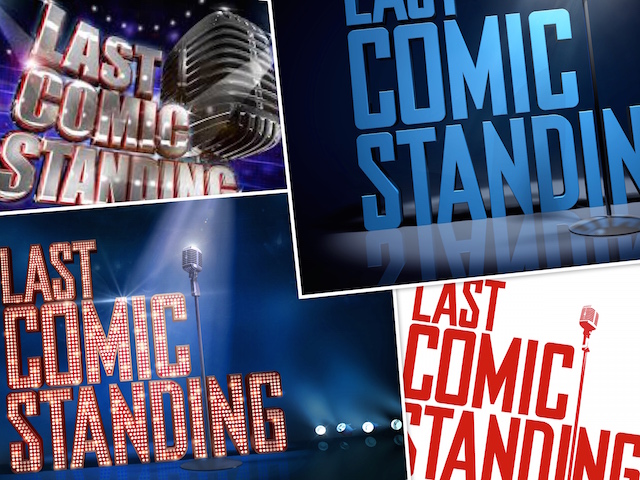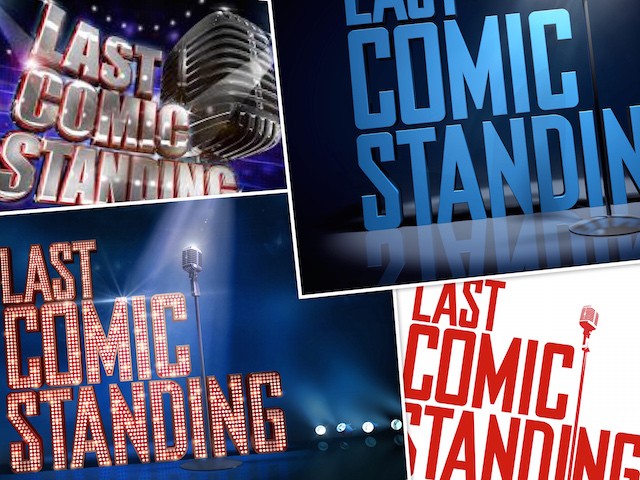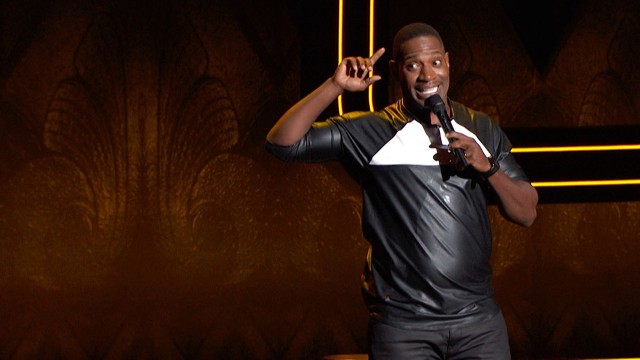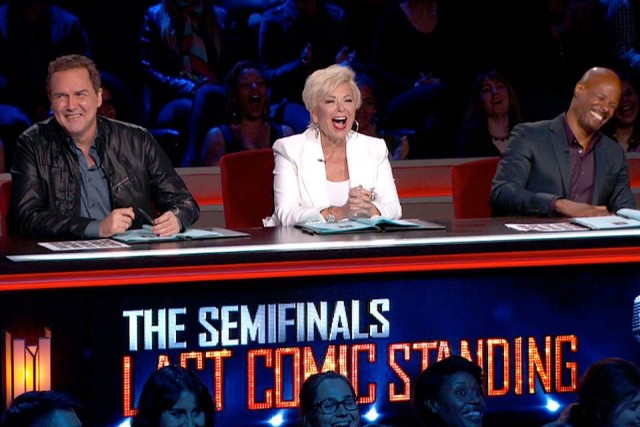Cutting Off The Legs of the Last Comic Standing


Is the History of Last Comic Standing Harmful To the Evolution of Comedy?
Last Comic Standing premiered in the summer of 2003 when I was 14. Like most kids skeptical of all things mainstream, I hated reality shows back then even more than I do today as a rational adult. However, I also loved standup comedy with an equally burning passion, so the idea of the two worlds combining left me cautiously optimistic. I enjoyed the first season of Last Comic Standing for the most part, but like most fans, I had a powerfully negative reaction to the fact Dat Phan was the winner. Eight additional seasons and winners followed, and although some were at least way more talented than Dat, the show remained a sterling example of everything wrong with the mainstream standup comedy industry today.
Dat Phan – Last Comic Standing s03 e04 by GladysLoyd
Standup comedy is an art form, and art requires judgment, but there’s nothing an artist typically fears more than judgment by someone who doesn’t understand the goal of his or her art. Obviously standup comics, like all artists, just need to get over that and accept the judgment sometimes, but it must be disheartening to have video evidence that the people judging you aren’t even attempting to relate in the slightest. The early rounds of the first few seasons of LCS featured late night comedy talent scouts judging literal open mic’ers, usually kicking out the “weird” or “unique” ones before they even got a full routine out, but given the nature of television time and this contest’s origins, that was almost fair. Now, they’ve done away with the real “lines around the block, anyone could win” mentality and set it up so you need an agent to even get booked on the first round of the show, and the judgment has accordingly gotten much worse. Once again, this was an appropriate move for TV, but the problem was that the people doing the judgment are constantly openly admitting they have no real connection to the material they’re supposed to be experts on.
On the latest season, a comedian named Harrison Greenbaum made a few jokes comparing the Bible to Harry Potter. I don’t feel the need to reprint the jokes, but I will point out that they weren’t exactly mind blowing or anything. If the judge, Norm Macdonald, said that they weren’t funny, everything would be fine, but Norm didn’t complain about the jokes being unfunny. Norm made an extremely confusing comment about how J.K. Rowling was Christian, and therefore the jokes didn’t make sense. To go on a personal aside for just one second, Norm is one of my comedy idols, and I believe he possesses the quality to make every single thing he says funny, but…what the actual fuck? This guy was paid to judge a comedy competition? He was paid the judge the most important comedy competition? He didn’t listen to a comedian tell a joke, he heard a few buzzwords and reacted to them alone. Even Roseanne, who praised Harrison before Norm’s complaint, seemed not to hear his jokes either, and only praised it for the opposite reason of Norm, in that she may be a bit anti-religion and liked that Harrison attacked it in general, regardless of what he actually, specifically said.
In the season prior, the winner was Rod Man, and when judging one of Rod’s final sets, judge Keenen Ivory Wayans openly admitted he couldn’t understand the words Rod was saying in the routine. This did not change his enjoyment of the jokes. If Rod Man were a vaudevillian master of slapstick, this would be impressive, but considering Rod’s routine was based entirely on the words he was saying, again…what the fuck? Rod’s bit included heavy use of the word “corn,” which Wayans though was “coin,” which definitely would have made the bit make no sense at all, and he still liked it somehow because he believed Rod was very energetic. While that’s nice, is energy really the most important quality to consider when judging the world’s most visible spoken word comedy competition? Is it somehow the only thing to consider?

What’s worse is when they don’t even judge comics based on the words they say at all, but based on something completely intangible that no one could ever actually describe. And keep in mind, the producers of Last Comic Standing were asked, on camera, to describe it, and couldn’t. The Norm example was pretty recent, but let’s go back to the most controversial moment in LCS history, all the way back in Season 2. During the semi-final round to decide who became official contestants on the show, Dan Naturman performed a set that most comedians would describe as absolutely fucking killer.
Whether or not you personally laugh at the jokes, anyone could watch a video of the set and see he had the crowd in the palm of his hands, and even the LCS judges gave him a standing ovation. Of course, the story was that he somehow didn’t it make the finals, and this revelation caused judges Drew Carey and Brett Butler to walk off the show. The producers admitted there was fine print that said the judges didn’t get the final say, which calmed down Carey and Butler since at least there was evidence they weren’t being blamed for the terrible decisions, but this was flat out admittance by NBC that they disagreed with the comedy experts they hired to judge comedy performances, and that they disagreed with a standing ovation given by a paying audience. So one more time…what the fuck? What were they even looking for?
Maybe it’s worth pointing out when we ask the question of what these producers are looking for that male comics dominate the show. Only one female has ever won the competition, and typically only two or three of the final ten contestants per season will be female. Anyone who’s been to open mics can tell you this isn’t entirely NBC’s fault, as there are still more male comedians than female comedians in general, but the division shouldn’t be this wide, and casting the judgment on television that this is pretty much where it should be is only making things worse. A few of the judges on the show have been female, but apparently the producers who make the real decisions are all men, or at least they just love male comics, because one thing Last Comic Standing really proves is that those few men in the production room are the only people who’s opinions on comedy actually matters. And chances are, those few producers aren’t in your audience.
Standup is an intensely personal and fiercely competitive field, and these two qualities often counteract each other to ensure some of the blandest and most mainstream comedians end up winning talent competitions like LCS. Every comedian is in vague competition with one another to begin with, but outside the confines of an actual contest, we can overlook this and compartmentalize comedians into their genres within the comedy world. It’s easy to pretend comics are really only in competition with the other comics most similar to them, but in reality the entertainment industry means all comedians are gasping for airtime, especially in a medium that isn’t as popular as it once was.
It might look like a comic just killed in front of an audience, their audience, but now there’s that nagging knowledge in the back of every comedian’s head that reminds them being a good comedian and killing in front of your audience apparently isn’t the goal behind standup comedy. People like Norm Macdonald are now there as the unexpected representation of the PC Police, and producers are happy to walk out smiling from behind closed doors and tell you it doesn’t matter if the crowd loved you, you just aren’t ready for TV, cause they said so. And somehow, Keenen Ivory Wayans laughing and smiling at the person who they decided is ready for TV without even knowing why might be the worst part of it all.
It’s hard to really argue with the producer’s in terms of what makes comedy financially viable, or what makes a competition show like Last Comic Standing successful as a TV show. The fact it has thus far lasted nine seasons and could easily last more must mean that this is the most commercially viable way to present comedy to the masses, especially when you consider it’s pretty much the only exclusively standup based show in the history of network television. With that in mind, thinking of fans of the comedy world, thinking of young comedians, and thinking of the 14-year-old cynic I was desperate for a show about standup—is it worth it? If Last Comic Standing is the best NBC and mainstream networks can do, should they even bother making a show about stand-up comedy?

It’s an extremely tough question to answer, because fans of stand-up will always have reasons to love the show, which they won’t really be able to find elsewhere. Even if a comedian only gets to do a 2-minute set on the first episode and gets rejected, they could walk away from the night with a thousand new followers on Twitter who may have never heard of them before they on the show. Anyone who understands artistic expression and fan appreciation can see how this is invaluable to the comedy world, and LCS needs to be thanked for it.
However, the negatives are overwhelming. LCS is forcing comedy to become more cookie-cutter while comedians strive to win a competition judged by people who either aren’t listening to the audience, or just don’t care, caught on their own bizarre wavelength. The winners are usually over-the-top caricatures, making LCS look a bit more like LCD. Younger fans, interested in the comedy world, could become jaded and cynical as they watch producers admit in plain sight that sometimes the more talented comedians lose to the corporate suits, but no one will tell really them why.
So, should Last Comic Standing remain on television, and should comedy fans keep watching? Well, according to website thetvpage, LCS is on a self imposed hiatus for 2016. But they’ll likely be back. Just remember it’s not actually a comedy show, it’s a competition. And we have no idea what they’re judging anymore.
Read more comedy news, stories, interviews with comedians, videos and comedy clips on our home page. Get more comedy news. Watch more viral videos. Read more interviews with the best comics in the business.
.
Latest posts by Lucas Wesley Snipes (see all)
- You Don’t Like Comedy Classics? You’re Kidding, Right? One Writer Questions History’s Love of the Three Stooges - November 3, 2016
- You Are On The Air: A Timeline of the How Comedy Entered the Race For President - September 25, 2016
- Why TV Needs a Tough Crowd - September 7, 2016
